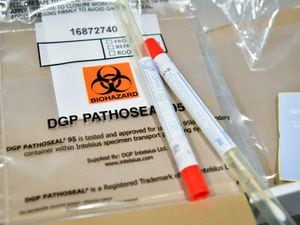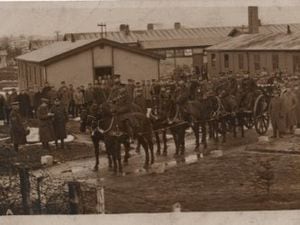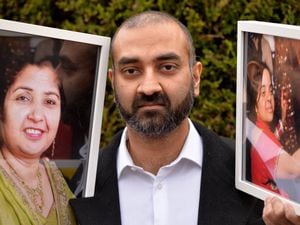'Army of volunteers' spreading awareness of Covid vaccines success
A council is training up an "army of volunteers" to spread awareness of Covid vaccines - as the number of infections have dropped sharply since January.

Sandwell Council is relying on these volunteers due to the borough's high proportion of people living in deprivation and those from BAME backgrounds, which are two groups that have low vaccine uptakes, said the council's director of public health, Lisa McNally.
It comes as the number of infection in Sandwell have dropped from 1,007 at the latest peak on January 8 to 226 on February 24, a fall which Dr McNally and her public health colleagues have welcomed.
She revealed they have worked 12 to 14 hour shifts each day at the height of infections just after Christmas, putting herself and her colleagues under immense pressure.
She said: "We know from previous research on other vaccination programmes, like the flu jab, that there is two groups that have a traditionally low vaccine uptake.
"Vaccine uptake is much lower in more economically deprived groups than more affluent groups.

"The second factor is ethnicity. We tend to find, nationally, that vaccination is lower in black, Asian and minority ethnic [BAME] groups.
"Of course, Sandwell has a high proportion - a much, much higher proportion than average - in those two groups.
"We have one of the most deprived local populations in England in terms of economic [factors], and we have one of the most culturally diverse.
"On paper, you would expect that we would have done badly on vaccination uptake. There lies the challenge, we sought of recognised that, even before the vaccinations were announced. We started putting together plans to try and buck the predicted trend - and so far, so good."
Sandwell has seen uptakes of at least 90 per cent in people aged 70 and over.
The borough is starting to vaccinate people aged 60 to 64, in line with the national vaccination programme.
It began with the most elderly people and has worked its way down the age brackets.
Dr McNally, who has a doctorate in psychology, expects uptake rates to decrease in younger people, as they may feel less likely to get infected.
Projection
She said: "We are running a few age brackets simultaneously.
"In the older groups, we are still trying to pick up a few. For example, in the over 80s and residential care home groups, they were the first ones.
"Even we have done most of those, it is still open for them. It is all open simultaneously.
"We are starting to make grounds on the 60 to 64 [age bracket], but we are only just starting on those.
"In the 65 to 69 group, the uptake is 81 per cent, so that one has done quite well already.
"But the projection is 85 per cent by the end of the week."
Asked whether the vaccine uptake could decrease with age, she said: "Absolutely. Let's face it, that wouldn't be surprising.
"We have got nine out of 10 people vaccinated who are 70 and above.
"But people aged 70 and above have just had a year of being told, by people like me, that they are really vulnerable.
"As we get to the younger age groups, where people might feel like they are more invincible to the virus, then it will become a bigger challenge to get a high percentage vaccinated.
"That is when we need to talk to people not just about their own health, but their responsibility to others."
In a bid to spread the message, the council has trained up community leaders in Sandwell for support.
Members of the public, such as faith leaders, have been given 90 minute training sessions, allowing them to take back information into the community.
So far, the council has trained up 100 volunteers but the local authority is aiming to reach 500, by the end of spring.
Dr McNally said: "They could be faith leaders or work in the voluntary sector, business people, or just anyone who feels they have some ability, and desire, to promote the vaccine, in their area.
"It could be as grand as the imam in a mosque addressing his whole community or just a person talking in their office to their colleagues.
"We put them through a training course. We go through the basics of how vaccines work and dispel some of the myths.
"They are like a little army of people scattered around Sandwell able to promote the vaccine."
With the roll-out of the vaccine, and the support of community leaders, the infection rate is dropping in Sandwell.
The borough has had one of the highest rates nationally, which has proven a difficult task for public health officials to manage.
At the peak, there were more than 3,000 cases a week. Now that has fallen to around 700 to 800, said Dr McNally.
She said: "When it was 3,000 cases a week, we were doing these 12 to 14 hour shifts, managing outbreaks.
"We don't actually know what kept us going and I think if it had gone on for much longer at level, it would have got really tough."
One of the reasons for Sandwell's high level of Covid cases has been its levels of deprivation, said Dr McNally.
She said: "Sandwell is the 12th most deprived area in the country. One in five of Sandwell's smaller areas fall into the most deprived 10 per cent nationally. That is a fairly stark statistic."
She cited a new report commissioned by the Government, which looks at Covid transmissions, and said: "They found at the moment that people in the most deprived group are twice as likely to be infected than those in the most affluent group.
"That is from the national REACT study, which is one of the biggest surveys that they repeat every so often. And equality got worse in lockdown.
"In certain areas, like Sandwell, lockdown doesn't offer you much protection.
"If Sandwell people didn't go to work, a lot of people in more affluent areas wouldn't get their food parcels, they wouldn't get food, they wouldn't get things manufactured that they need in everyday life.
"There is a bit of a social-economic point. In Sandwell, there is no lockdown in terms of offering people protection."





